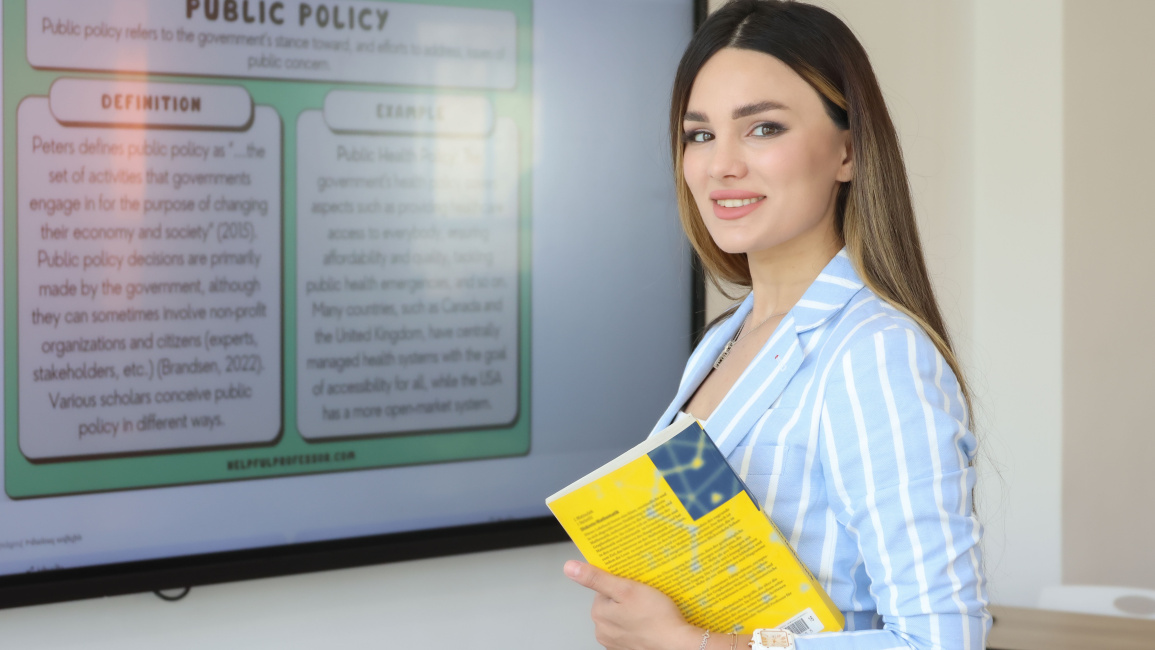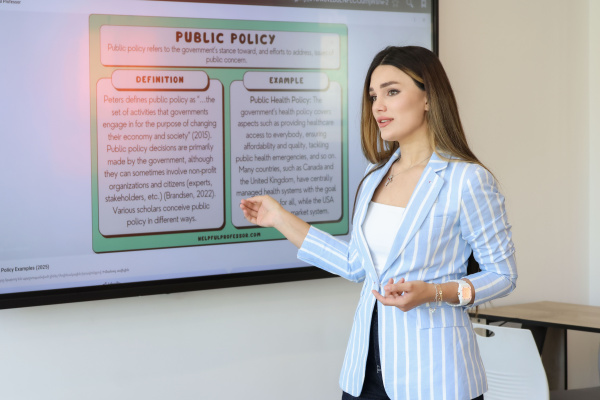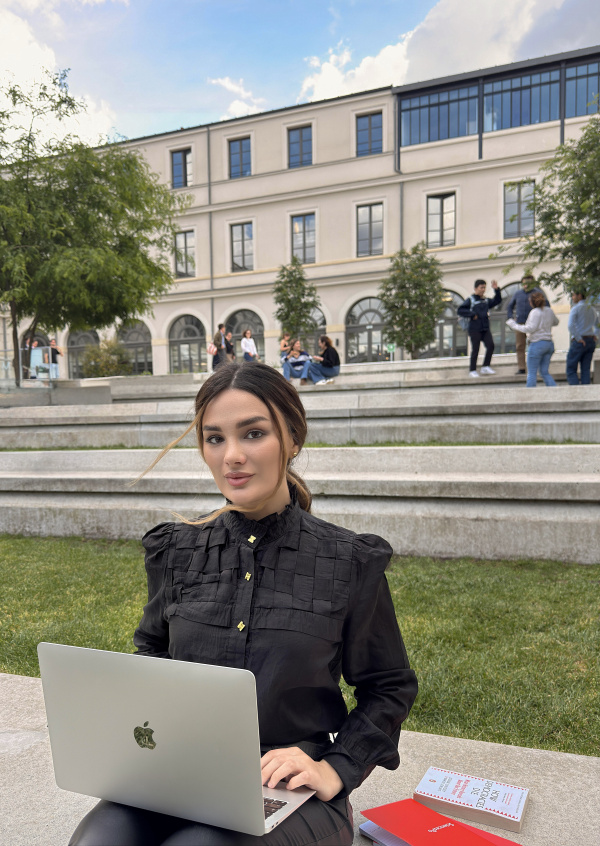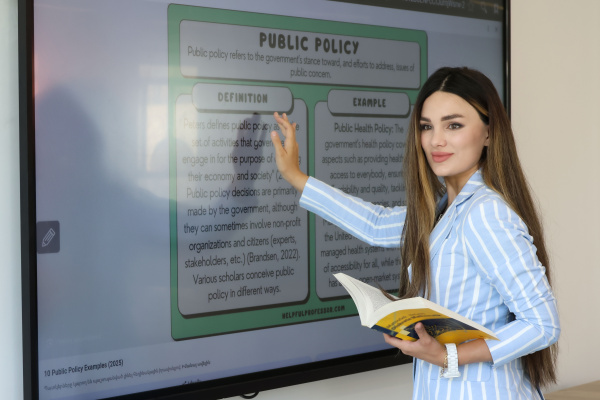June 18, 2025 | 13:30
Educational programs
Education
International cooperation
New knowledge and international experience: advantages of opportunities provided by YSU
Evelina Voskanyan, a student in the "Public Policy" master’s program at Yerevan State University, traveled to France in the second semester of 2025 to continue her studies at Sciences Po under the Erasmus+ program. She has recently returned to YSU, and we spoke with her about the knowledge she gained abroad, the significance of interdisciplinary collaboration, the multicultural learning environment, and more.

Experts from International Institutions Deliver Lectures
The courses I selected — "Populism and the Crisis of Democracy in Europe," "Risk Analysis," "EU Institutions and Politics," and "Global Demographic Policy" — gave me the opportunity to study in depth the key directions of public policy, ranging from theoretical foundations to practical applications. Particularly valuable was the fact that the lectures were delivered by highly ranked experts with extensive international experience. For instance, Gaston Deck, Legal Advisor to the Court of Justice of the European Union, taught the course "EU Institutional Law," providing a unique platform for professional dialogue.

Combining Study and Practice Broadens Understanding of International Governance
The educational environment abroad contributed not only to acquiring knowledge but also to discovering professional opportunities. Outside of class hours, I attended labor market events, through which I learned about short-term internship opportunities at the Office of the United Nations High Commissioner for Human Rights (OHCHR). After successfully passing the interview stage, I began combining my studies with an internship at the Geneva-based office. This experience in international human rights processes — particularly involving UN special rapporteurs and the Universal Periodic Review mechanism — enabled me to apply my theoretical knowledge in practice. Additionally, I participated in the Youth & Leaders Summit 2025 organized by PSIA and The New York Times, where the future of international cooperation was discussed in the presence of global leaders, including UN Secretary-General António Guterres, WTO Director-General Ngozi Okonjo-Iweala, and OECD Secretary-General Mathias Cormann. I also visited numerous international institutions such as UNESCO, the WTO, and various embassies, thereby broadening my understanding of international governance and political contexts.
Driven by professional interests, I traveled to several European cities, including Geneva (for a four-month internship at OHCHR), Brussels (engaging in dialogues with EU institutions and civil society representatives), and Strasbourg (to familiarize myself with the activities of the Council of Europe). These experiences deepened my academic knowledge while simultaneously expanding my perspectives on international cooperation and cultural coexistence, both professionally and personally.

Modern Library, Individual Study Rooms, and Institute Infrastructure Support Learning
Sciences Po provided modern, student-centered infrastructure. Key resources included a modern library offering access to thousands of scientific journals and databases (JSTOR, Scopus, OECD iLibrary), individual study rooms, and state-of-the-art facilities for group discussions. The institute also used electronic platforms for distributing study materials, organizing courses, and conducting assessments.
The library was especially helpful during the preparation of my master’s thesis, when it was necessary to integrate primary sources with international expert analyses.
Knowledge and Opportunities Gained at Sciences Po Produce Significant Outcomes
Taking advantage of the opportunity provided by the host university abroad, I co-authored an English-language academic article titled "Public–Private Sector Cooperation: Opportunities and Risks" with Associate Professor Ashot Mardoyan from the Chair of Public Administration at YSU Faculty of International Relations. The article is scheduled for publication in an upcoming issue of the scholarly journal Alternative.
Currently, I am working on my master’s thesis titled "The Role and Impact of Artificial Intelligence on Organizational Leadership Processes: A Case Study." The choice of this topic stems from a shared academic interest between my thesis supervisor and me in the digitalization of public administration.
Multicultural Environment Deepens Understanding
The multicultural academic environment at the institute was marked by intellectual diversity and rich content. Approximately 70% of the student body consisted of international students, representing more than 150 countries. I had the opportunity to collaborate actively with peers from Europe, Asia, Africa, and Latin America. This environment fostered a multidimensional approach to addressing issues.
Rather than posing obstacles, cultural differences enriched the classroom experience by facilitating the collision, comparison, and synthesis of perspectives, resulting in a deeper understanding of complex issues. For instance, during discussions on public policy, the same phenomenon could be interpreted with an emphasis on political stability in Africa, social inequality in South America, or transparency in governance in Scandinavia. These exchanges allowed me to reconsider and re-evaluate certain approaches that had become ordinary within national contexts.
Interdisciplinary Initiatives Serve as a Foundation for Innovative Solutions
Abroad, the opportunities for interdisciplinary collaboration are notably extensive. For example, students from faculties of political science, economics, law, and sociology work together on large-scale projects and research initiatives, examining a single topic—such as global environmental policy or economic inequality—from multiple perspectives. This model promotes a comprehensive and integrated approach, facilitating the discovery of innovative and practical solutions.
At YSU, such interdisciplinary initiatives are relatively limited and require further development. I would like to see more interactive teaching methods at YSU, updated curricula, and increased emphasis on international exchange and research opportunities.

Professors Abroad Encourage Critical Discussion
There are few significant differences between professors at Sciences Po and those at YSU. In both institutions, lecturers are highly professional, experienced, and genuinely invested in student success. The main distinction lies in teaching style: professors abroad tend to be more open and communicative, encouraging critical discussion and active student participation. At YSU, the focus is more on delivering knowledge in a thorough and structured manner.
Knowledge and Experience Gained at YSU Pave the Way for Study Abroad
The opportunity to continue my education abroad was the result of a combination of high academic performance, a commitment to professional development, and personal interest in gaining international experience. I viewed it as an exceptional platform for exploring global academic practices and developing a more nuanced approach to both future scholarly work and practical policy analysis.
The experience and engagement I had at YSU—particularly my involvement in various professional initiatives—enabled me to apply for and participate in the Erasmus+ mobility program.

